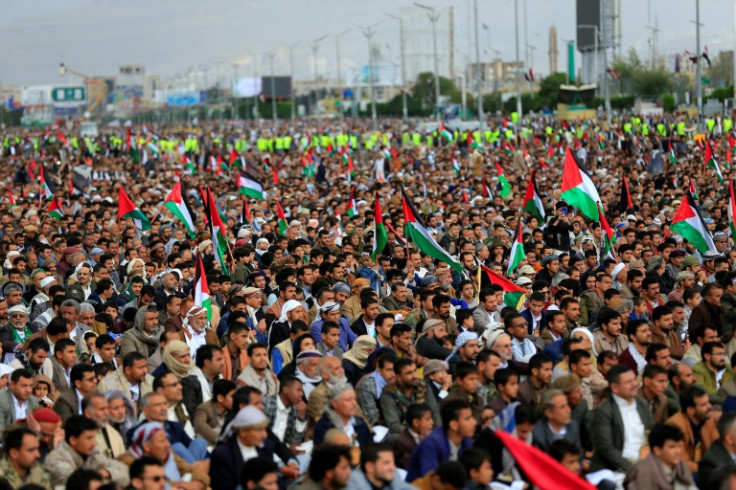Yemen's Huthi Rebels Vow More Attacks On Israel
Yemen's Iran-backed Huthi rebels on Tuesday pledged more attacks against Israel if its war on Hamas in Gaza continues, saying it had already fired drones and ballistic missiles in three separate operations.

Yemen's Iran-backed Huthi rebels on Tuesday pledged more attacks against Israel if its war on Hamas in Gaza continues, saying it had already fired drones and ballistic missiles in three separate operations.
"The Yemeni Armed Forces... confirm they will continue to carry out qualitative strikes with missiles and drones until the Israeli aggression stops," said a Huthi military statement aired on the rebels' Al-Masirah TV.
It said Huthi rebels "launched a large batch of ballistic missiles... and a large number of armed aircraft" towards Israel on Tuesday, in the third such operation since the Gaza assault began on October 7 after Hamas militants staged the worst attack in Israel's history.
Earlier, Israel's military said a "hostile aircraft intrusion" had set off warning sirens in Eilat, its Red Sea resort, later saying it had intercepted a "surface-to-surface missile" fired toward Israeli territory, that was "successfully intercepted by the 'Arrow' aerial defence system".
"All aerial threats were intercepted outside of Israeli territory," it said.
Abdelaziz bin Habtour, prime minister of the Huthi government, on Tuesday said the rebels were "part of the axis of resistance" against Israel, which includes Tehran-backed groups in Lebanon, Syria and Iraq, and were fighting with both "words and drones".
"It is one axis and there is coordination taking place, a joint operations room, and a joint command for all these operations," he said.
"We cannot allow this arrogant Zionist enemy to kill our people."
The Huthis seized Yemen's capital Sanaa in 2014 and control large swathes of the country. They have previously carried out strikes in Saudi Arabia and the United Arab Emirates, which carried out a military campaign against the rebels.
The United States, which has tense relations with Iran but has welcomed a de facto truce in Yemen's bloody civil war since April 2022, responded carefully to the Huthi announcement.
"Anyone thinking about joining this conflict should not do it," State Department spokesman Matthew Miller told reporters in Washington.
Pentagon spokesman Brigadier General Pat Ryder confirmed that Israel took down a medium-range missile fired by the Huthis.
"As we've said before, we want to prevent a broader regional conflict," Ryder said.
Israel had blamed the Huthis for a drone attack on Friday, saying its aircraft had intercepted "hostile targets" headed for southern Israel.
At the same time, six people were lightly injured when debris hit a building across the border from Eilat in the neighbouring Egyptian resort of Taba, the Egyptian army said at the time.
On October 19, the US Navy said it shot down three land-attack cruise missiles and "several" drones fired by the Huthis, possibly at Israel.
Israel has been pounding Gaza since the October 7 attack when Hamas gunmen stormed across the border and killed more than 1,400 people, mostly civilians, and kidnapped more than 230 others.
Since then, Israel's bombardments have killed more than 8,500 people, over 3,500 of them children, according to the health ministry in Hamas-run Gaza, an impoverished slice of land which is home to 2.4 million people.
Concerns are high over a regional conflagration, especially as Iran -- which financially and militarily backs Hamas but insists it had no involvement in the October 7 attack -- has loyalists and proxy fighters in Iraq, Syria, Lebanon and Yemen.
Since the Gaza conflict began, there have been a string of attacks on US forces in Iraq and Syria as well as almost daily exchanges of fire across the Israel-Lebanon border between Hezbollah and the Israeli army.
On Sunday, Iranian President Ebrahim Raisi warned on X, formerly Twitter, that Israel had "crossed the red lines, and this may force everyone to take action", without elaborating.
© Copyright AFP 2025. All rights reserved.





















